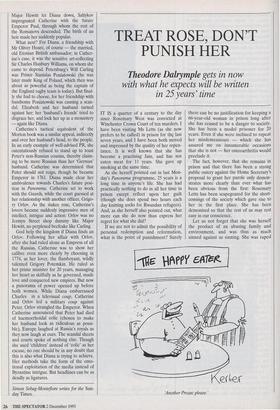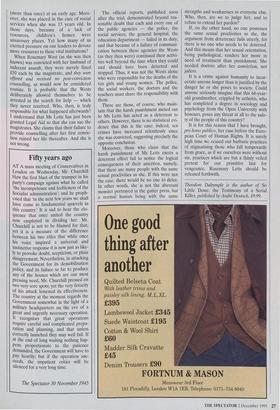TREAT ROSE, DON'T PUNISH HER
Theodore Dalrymple gets in now with what he expects will be written in 25 years' time IT IS a quarter of a century to the day since Rosemary West was convicted at Winchester Crown Court of ten murders. I have been visiting Ms Letts (as she now prefers to be called) in prison for the last seven years, and I have been both moved and impressed by the quality of her repen- tance. It is well known that she has become a practising Jain, and has not eaten meat for 11 years. She gave up smoking at the same time.
As she herself pointed out in last Mon- day's Panorama programme, 25 years is a long time in anyone's life. She has had practically nothing to do in all her time in prison except reflect upon her guilt (though she does spend two hours each day knitting socks for Rwandan refugees). And, as she herself also pointed out, what more can she do now than express her regret for what she did?
If we are not to admit the possibility of personal redemption and reformation, what is the point of punishment? Surely there can be no justification for keeping a 66-year-old woman in prison long after she has ceased to be a danger to society. She has been a model prisoner for 20 years. Even if she were inclined to repeat her misdemeanours — which she has assured me on innumerable occasions that she is not — her osteoarthritis would preclude it.
The fact, however, that she remains in prison and that there has been a strong public outcry against the Home Secretary's proposal to grant her parole only demon- strates more clearly than ever what has been obvious from the first: Rosemary Letts has been scapegoated for the short- comings of the society which gave rise to her in the first place. She has been demonised so that the rest of us may rest easy in our conscience. Let us not forget that she was herself the product of an abusing family and environment, and was thus as much sinned against as sinning. She was raped Another Prozac please.' (more than once) at an early age. More- over, she was placed in the care of social services when she was 15 years old. In those days, because of a lack of resources, children's homes were unsavoury places. Yet how many of us exerted pressure on our leaders to devote more resources to these vital institutions?
When Rosemary West (as she was then known) was convicted with her husband of indecent assault, they were merely fined £50 each by the magistrate, and they were offered and received no post-conviction counselling, as would now be considered routine. It is probable that the Wests deliberately allowed themselves to be arrested in the search for help — which they never received. Who, then, is truly responsible for what happened afterwards? I understand that Ms Letts has just been granted Legal Aid so that she can sue the magistrates. She claims that their failure to provide counselling after her first convic- tion ruined her life thereafter. And she is not wrong. The official reports, published soon after the trial, demonstrated beyond rea- sonable doubt that each and every one of the public agencies — the police, the social services, the general hospital, the education department — failed in its duty; and that because of a failure of communi- cation between these agencies the Wests (as they then were) continued their activi- ties well beyond the time when they could and should have been detected and stopped. Thus, it was not the Wests alone who were responsible for the deaths of the ten girls and young women. The police, the social workers, the doctors and the teachers must share the responsibility with them.
There are those, of course, who main- tain that the harsh punishment meted out to Ms Letts has acted as a deterrent to others. However, there is no statistical evi- dence that this is the case: indeed, sex crimes have increased relentlessly since she was convicted, suggesting precisely the opposite conclusion. Moreover, those who claim that the harsh punishment of Ms Letts exerts a deterrent effect fail to notice the logical consequences of their assertion, namely, that there are many people with the same sexual proclivities as she. If this were not the case, there would be no one to deter. In other words, she is not the aberrant monster portrayed in the gutter press, but a normal human being with the same strengths and weaknesses as everyone else. Who, then, are we to judge her, and to refuse to extend her pardon?
If, on the other hand, no one possesses the same sexual proclivities as she, the argument from deterrence fails utterly, for there is no one who needs to be deterred. And this means that her sexual orientation, being pathological, renders her more in need of treatment than punishment. She needed doctors after her conviction, not jailers.
It is a crime against humanity to incar- cerate anyone longer than is justified by the danger he or she poses to society. Could anyone seriously imagine that this 66-year- old grandmother, crippled by arthritis, who has completed a degree in sociology and psychology from the Open University with honours, poses any threat at all to the safe- ty of the people of this country?
It is for this reason that I have brought, pro bono publico, her case before the Euro- pean Court of Human Rights. It is surely high time we ceased our barbaric practices of stigmatising those who fall temporarily from grace, as if we ourselves were without sin, practices which are but a thinly veiled pretext for our primitive lust for vengeance. Rosemary Letts should be released forthwith.
Theodore Dalrymple is the author of So Little Done: the Testimony of a Serial Killer, published by Andre Deutsch, £9.99.











































































 Previous page
Previous page